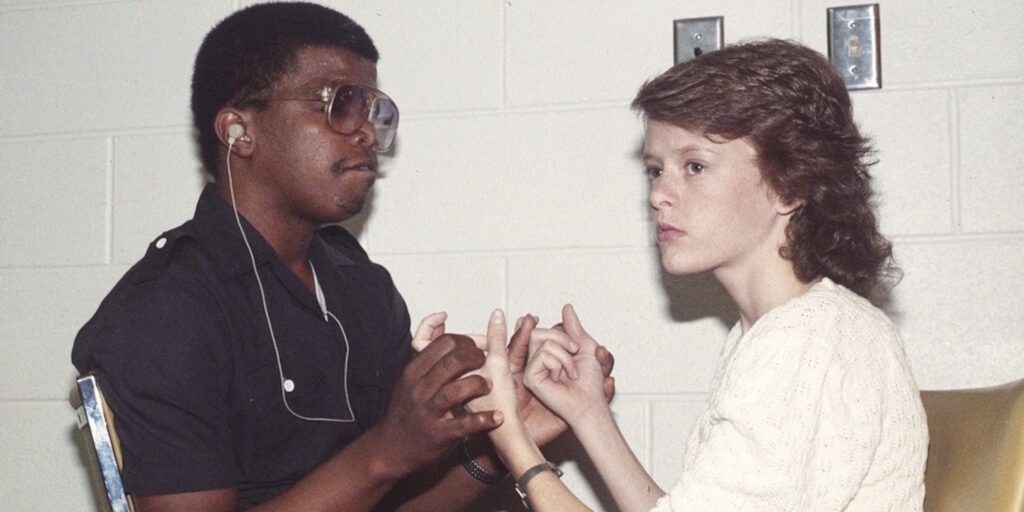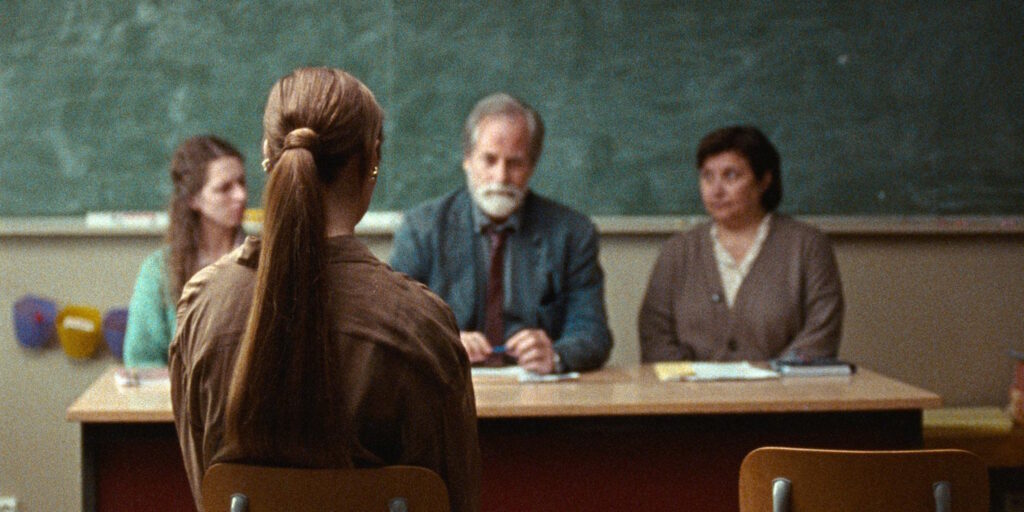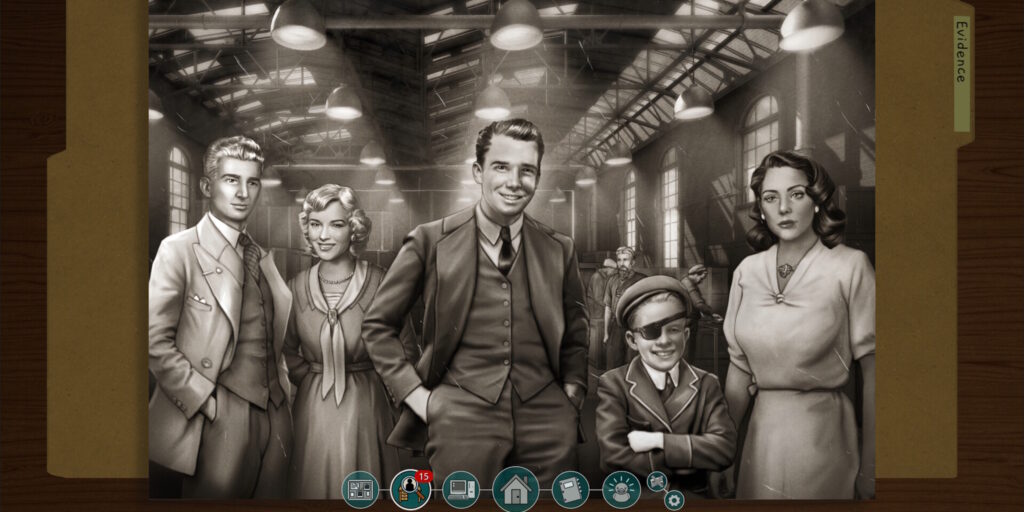When we first meet hard-partying British teenagers Tara (Mia KcKenna-Bruce), Em (Enva Lewis), and Skye (Lara Peake), they’ve already alighted in Malia, a notoriously bacchanalian resort town on the Greek island of Crete. The girls have recently finished their final year of school and are waiting fretfully for the results from their future-defining GCSE examinations. For the next week, however, there is only Malia and the promise of nonstop hedonistic excess. Jet-lagged and hyped up on adrenaline – not to mention a few other hormones – the trio take an impromptu wee-hours dip in the freezing ocean before checking into their hotel. “Best Holiday! Ever!,” they whoop to the predawn sky, setting a high bar for their five-day marathon of drinking, clubbing, and making it with properly “fit” guys (and girls). For at least one of them, however, the sex part of the festivities is aspirational: Tara has never done the deed, and Em and Skye have made it their pet project to get their mate good and laid before the week is out.
The implication is that even the most rizzless sad sack can score in a place like Malia, which has made a cottage industry out of indulging the urges of unchaperoned young foreigners on bad-decisions benders. There is accordingly a twinge of pity in Em and Skye’s outwardly helpful prodding, which just makes Tara all the more anxious about the expectations dangling over her holiday like a dick-shaped sword of Damocles. Not that she should have any trouble attracting male attention: a tawny 5-foot-tall firecracker with a husky London accent, she’s the sort of fearless charmer who can bullshit her way into a pool-view upgrade with a smile. Indeed, when Tara steps onto the hotel balcony during their first morning in Greece, she instantly attracts the eye of Badger (Shaun Thomas), a jokester from the next room over with a blond dye job and unfortunate neck tattoo. Before you can say “love the one you’re with,” the girls are getting shitfaced with Badger and his mates Paddy (Samuel Bottomley) and Paige (Laura Ambler), all while hopping from one pool party and nightclub to the next.
Does Tara actually want to have sex? It doesn’t really matter. Her embarrassment about her lack of experience has become an all-consuming proxy for other, more subtle rifts that have formed between her and her friends. This holiday offers the opportunity to exert some measure of control, to achieve the one goal that should be straightforward for a conventionally attractive 16-year-old girl in a vodka-drenched paradise. However, as writer-director Molly Manning Walker’s outstanding debut feature How to Have Sex smartly conveys, wanting something is not the same thing as conning yourself into wanting it. Doubtlessly, some viewers will see Walker’s film as a glorified PSA about the enormous, complex social pressures facing adolescent girls, but How to Have Sex is up to something much more fascinating than a finger-wag at hookup culture. It just might be the best film ever made about the crushing anxiety of trying to convince yourself that you’re having a good time.
To be sure, there is a low-key horror story lurking beyond the candy-colored club lights of Walker’s feature. Heck, it would be unrealistic bordering on irresponsible to make a grounded drama about teenage girls getting blackout drunk in a strange city without factoring in the looming shadow of sexual violence. Part of what makes How to Have Sex so refreshing, however, is that it frankly portrays Tara and her friends as petty, shallow, and reckless – as almost all 16-year-olds are – without ever allowing this unflattering depiction to devolve into outright victim-blaming. The girls make transparently bad choices, but Walker is much more interested in observing the intricate social dynamics that lead to those choices than in criticizing her characters as moral actors.
Offhand lines about exam results and future plans reveal the class-based fissures that are already starting to separate Tara from her mates, intensifying the urgency of their sexy island getaway as a kind of bonding experience. There are also gender, race, and orientation dynamics at play: The forces that induce Em, a femme Black lesbian, to hop into bed with Paige are distinct from the pressures that Tara feels to find a tolerable candidate among the Axe-scented throngs of faceless, overeager lads. Meanwhile, the limits of Skye’s wing-woman largesse gradually become apparent as she begins flicking green-eyed shade at Tara and subtly sabotaging her friend’s fumbling efforts whenever she exhibits interest in a boy (or vice versa). Not since Kate Beckinsale’s mean-girl bestie in The Last Days of Disco (1998) has a character shifted so easily and perniciously between affection, cruelty, and obliviousness.
The factor that truly holds How to Have Sex together, however, is McKenna-Bruce’s riveting, finely tuned performance as Tara. Best known in the U.S. for her stint on the British prep-school crime series Get Even (2020), the 26-year-old actress effortlessly sheds a decade of worldliness to embody the panicked anguish of a deeply alienated girl trying to project the good-time self-assurance that others expect of her. McKenna-Bruce achieves this without the aid of clunky declarations – Walker’s screenplay is far too shrewd for that. Instead, it is expressed in the way that Tara’s face slips with heartbreaking ease into a kind of zombified despondence when she thinks no one is watching. It’s in the way that her bubbly dancing on the club floor betrays a hint of flop sweat, before slowly tapering off into glum shuffling. It’s in the way that her smiling eyes wilt as it dawns on her that a guy she was “with” moments ago has just been smoothly sniped by another woman. Most heartbreakingly, it’s in the mask of levity she carefully assumes after a mid-morning walk of shame through deserted, litter-blown streets, lest her mates suspect that her night out was anything less than epic.
How to Have Sex has already received rightful praise for its deglamorized depiction of peer pressure, casual misogyny, and the sticky tribulations of female friendship. What truly makes Walker’s feature such a rewarding work, however, is its uncommonly sensitive depiction of fearful self-delusion. If you’ve ever stood awkwardly in a corner at a party quietly repeating, “This is fun, right? I’m having fun,” you will see a part of yourself in Tara. Like no other film in recent memory, How to Have Sex understands the overpowering urge to fake enthusiasm for the things that you’re “supposed” to enjoy. Critically, it connects this insidious dynamic to the personal and political dimensions of adolescent sexuality, illustrating how the distinction between different types of denial is a matter of degree, not kind. There are certainly worse morning-after revelations a woman can have after waking up crusted in vomit and mascara, but “Wait, is this awful, actually?” is never a pleasant epiphany.
How to Have Sex is now playing in select theaters.




